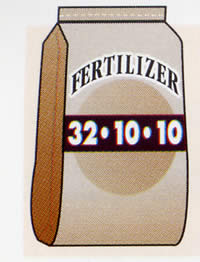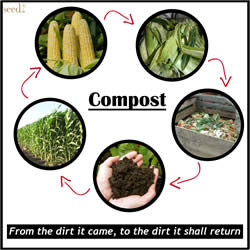Difference between Fertilizer and Compost
Key Difference: Fertilizer provides nutrients to the plant in order for them to grow. Compost is a mixture of organic waste that provides nutrients to the soil.
Trying to cultivate a garden is no easy feat. It requires a lot of hard work and knowledge to start a garden or a vegetable patch in the backyard. There are two things that often confuse a first time gardener; do they require compost or fertilizer? And what is the difference between the two? Well, compost and fertilizer are two things are required for the plant and the soil to acquire its nutrients. However, they are different from each other.
 In order for a plant to grow and thrive, it requires Carbon, hydrogen, oxygen, nitrogen, phosphorus and potassium. The former three are easily available from air, water and other sources, while the latter three are hard to come by. These nutrients are often found decay of plants or living organisms, while nitrogen is only available by recycling nitrogen from dead to living plants. That’s where fertilizers come into the picture, these provide the necessary nutrients in order to make the plants strong and thrive better.
In order for a plant to grow and thrive, it requires Carbon, hydrogen, oxygen, nitrogen, phosphorus and potassium. The former three are easily available from air, water and other sources, while the latter three are hard to come by. These nutrients are often found decay of plants or living organisms, while nitrogen is only available by recycling nitrogen from dead to living plants. That’s where fertilizers come into the picture, these provide the necessary nutrients in order to make the plants strong and thrive better.
There are two kinds of fertilizers, organic and synthetic. Organic fertilizers are fertilizers that are created using natural products such as manure, compost, litter, bone meal, etc. These are created using organic materials and are more beneficial to plants as they do not cause harm in the long run. Inorganic or synthetic fertilizers are fertilizers that use inorganic compounds or chemicals in order to provide the nutrition required for the grass. Inorganic fertilizers are popular as they show results quickly and can also be absorbed by the plants faster. Inorganic fertilizers are frowned upon as they can run off into human water reserves and contaminate the supply. Other reasons also include that in the long run the chemicals are believed to dangerous of the soil and the earth.
Fertilizers typically provide macronutrients such as nitrogen (N), phosphorus (P), potassium (K), calcium (Ca), magnesium (Mg), and sulfur (S) and micronutrients such as boron (B), chlorine (Cl), copper (Cu), iron (Fe), manganese (Mn), molybdenum (Mo), zinc (Zn) and nickel (Ni). The numbers on the bag of the fertilizer can tell the buyer the percentages of available nitrogen and the ratio of the different chemicals. For example a 12-10-8 would signify that the bag has 12% nitrogen, 10% phosphorous and 8% potassium. The rest is made up of the other nutrients and various different percentages.
 Compost is organic matter that has been decomposed to use as a fertilizer and soil amendment or the plants. So, in actuality it is a type of organic fertilizer. Compost plays an important role in organic farming. At basic level, compost is a mixture of wetted organic matter such as leaves, food waste and water that has been left to be broken down by organisms over a period of time. The main purpose of providing organic compost is to attract organisms that can break down the heap of compost and release nutrients in return which can be absorbed by the plants. Modern composts that are pre-packaged also ensure that it has a good amount of water, air and carbon- and nitrogen-rich materials.
Compost is organic matter that has been decomposed to use as a fertilizer and soil amendment or the plants. So, in actuality it is a type of organic fertilizer. Compost plays an important role in organic farming. At basic level, compost is a mixture of wetted organic matter such as leaves, food waste and water that has been left to be broken down by organisms over a period of time. The main purpose of providing organic compost is to attract organisms that can break down the heap of compost and release nutrients in return which can be absorbed by the plants. Modern composts that are pre-packaged also ensure that it has a good amount of water, air and carbon- and nitrogen-rich materials.
Composts are also a slow form of nutrition for the soil. The breaking down process takes time, which also allows plants to slowly take nutrients for the material that is being broken down. It also refreshes the soil and keeps it healthy. Compost can be used in gardens, landscaping, horticulture, and agriculture. Compost is also used in agriculture for lands that have been completely eroded and can no longer grow any vegetation. Compost is useful for erosion control, land and stream reclamation, wetland construction, and as landfill cover.
In order to work properly, compost requires an equal concentration of water, oxygen, carbon and nitrogen. The proper ratio allows the decomposing organisms to work at a faster rate on the pile. A good compost pile also contains materials such as urine, manure and bedding. Humans excrete more nutrients required by plants in urine than in feces. The urine is a mixture of water and urea and has nutrients such as nitrogen, phosphorus and potassium. Urine can be used directly as a fertilizer and sprayed on the soil or it can be used to wet the compost and allow it to kill pathogens that destroy the plant, along with providing the soil with nutrients. An active compost pile has organisms such as bacteria, actinomycetes, fungi, protozoa and rotifers.
Fertilizer and compost are in fact different from each other. Fertilizer provides nutrients and energy to the plants, while compost rejuvenates the soil. Fertilizer can be compared to a person being fed sugar, it would give them energy for the time being but it will also deplete as a faster rate. However, compost breaks down slowly and also provides nutrition slowly allowing the plants to sustain themselves over longer periods of time. In order to have a successful garden, a gardener should ensure that the soil as well as plants get nutrients. Both fertilizer and compost should be used equally. If a person is going for an organic approach, then organic fertilizers are also available.
Image Courtesy: extension.usu.edu, students.washington.edu









Add new comment